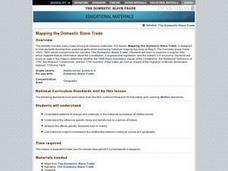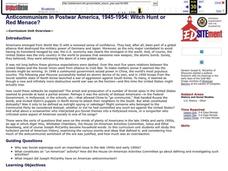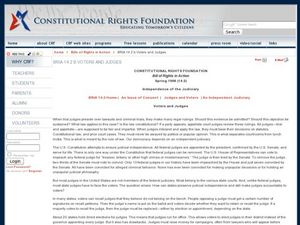Anti-Defamation League
Harriet Tubman on the $20 Bill: The Power of Symbols
How important are symbols and symbolic gestures in society? Middle schoolers have an opportunity to analyze the importance of symbols on American currency with a lesson plan that investigates the controversies surrounding redesigning the...
Alabama Department of Archives and History
Alabama's Secession in 1861: Embraced with Joy and Great Confidence. Why?
From December 20, 1860 to June 8, 1861, eleven states seceded from the Union. Alabama seceded on January 11, 1861. Why did so many white Alabamians want to secede? Why did they believe the South could win the war? These are the essential...
Constitutional Rights Foundation
Driver’s Licenses And Unauthorized Immigrants
Should driver's licenses be granted to unauthorized immigrants? That is the question class members grapple with in a lesson that asks them to first read a fact sheet that details the arguments for and against licensing unauthorized...
Center for Civic Education
The Power of Nonviolence: What Is Nonviolence? What Does It Cost?
Your young learners will delve into the language of primary source documents in order to identify the characteristics, benefits, and costs of nonviolence. The lesson plan includes a mix of activities, including an anticipatory activity,...
Curated OER
Mapping the Domestic Slave Trade
Middle schoolers develop their analytical skills when examining historical maps. They examine a map for data which supports textual information about the Constitution, Congressional legislation, and the historic U.S. economy.
Curated OER
Witch Hunt or Red Menace? Anticommunism in Postwar America, 1945-1954
Students investigate what constitutes an "un-American" activity and why Soviet espionage was such an important issue in the 1940's and 1950's. Joseph McCarthy's impact on American anticommunism is examined in this lesson. There are three...
PBS
The History of Book Banning in America
Harry Potter, Are You There God? It's Me, Margaret, To Kill a Mockingbird. Kids view a slide show and then discuss the seven banned books featured in the presentation and the reasons why the books may have been banned.
Curated OER
Legislative Branch
Students analyze Article 1 of the Constitution. They respond to the Public Criticism E-Learning module.
Curated OER
Tally of the 1824 Electoral College Vote
Twelfth graders study the parts of the Constitution that address presidential election. They complete a variety of activities designed to spark debate about the flaws in the Electoral College system.
Curated OER
How the Court Became Supreme
Students investigate how the Supreme Court changed under the leadership of John Marshall. In this Supreme Court instructional activity, students recognize the role of the Supreme Court as well as the significance of Marbury v. Madison....
Curated OER
Can I Have a Jury Trial?
Students examine the difference between a jury trial and a bench trial. They discuss any protections that the Indiana and United States Constitution offers its citizens. They use the internet to research any current press of jury trials.
Curated OER
Recycling Lesson Plan
Students examine the role of choice in a democracy, the choice to participate and not to participate. They take a position on the role of recycling and whether in a democracy people can be forced to recycle. They break into for and...
Curated OER
Voters and Judges
Students analyze the work on independent judiciaries. In this federal courts lesson, students listen to their instructor lecture on details of federal cases. Students respond to discussion questions and participate in an activity...
Curated OER
The 1808 Slave Trade Abolition Deadline
Students study the trans-Atlantic Slave trade. In this slave trade activity, students study the Constitutional Convention Notes and the impact on United States slavery. Students research the slave trade database and other primary sources...
Curated OER
Should Homosexuals Have the Right to Laws Protecting Them From Discrimination?
Students explore discrimination issues in America. In this homosexual rights lesson, students listen to their instructor lecture on antidiscrimination laws and gay rights. Students respond to questions about the Romer v. Evans case.
Curated OER
Abraham Lincoln, the 1860 Election, and the Future of the American Union and Slavery
Students examine Abraham Lincoln's political views about slavery. In this American Civil War lesson, students determine how Lincoln's beliefs led to the restriction of slavery in American territories. Student also analyze the party...
Curated OER
Giving Voice to History
Students examine the plight of Japanese Americans during World War II. In this World War II lesson, students participate in a mock evocation simulation, research primary and secondary documents about internment camps, and share their...
National Endowment for the Humanities
Slavery and the American Founding: The "Inconsistency Not to Be Excused"
High schoolers examine slavery in the revolutionary and colonial eras of the United States. In this slavery lesson, students investigate the presence of slavery in early America, the language of the Constitution, and the intent of the...
Curated OER
African American Women Trailblazers
Students take a closer look at the accomplishments of African-American women. In this African-American history lesson, students explore the work of Bessie Coleman, Gwendolyn Bennett, Lulu Madison White, and Zelma Watson George as they...
Curated OER
In the Courts
Students explore desegregation in the courts. In this civil rights lesson, students listen to their instructor present a lecture on Supreme Court cases Brown v. Board of Education and Plessy v. Ferguson. Students examine the cases and...
Curated OER
The National Women's Party and the Enfranchisement of Black Women
Students analyze the attitudes and hostility given to African-American women within the National Women's Party. They finish the lesson by examining another moment in the party's history and writing about it.
Curated OER
The Constitution
Eighth graders conduct research about the weaknesses of the Articles of Confederation, the Virginia Plan, the New Jersey Plan, the Connecticut (Great) Compromise, and the 3/5 Compromise.
Curated OER
We Have Rights
Students investigate the concept of having rights as citizens. In this citizenship lesson, students examine the rights that are given to citizens of the United States in the Bill of Rights. They draw pictures of eight of their...
Curated OER
A "Clear and Present Danger"
Students define what is meant by clear and present danger. In this First Amendment lesson, students listen to their instructor present a lecture regarding the details of the Sedition Act of 1798. Students consider the constitutionality...

























